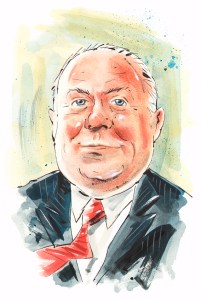REBNY 2015 Honoree Daniel Kindbergh
By Sara Pepitone January 14, 2015 1:30 pm
reprints

A certified public accountant since 1982, Daniel Kindbergh was in the audit world for about four years before he joined E. F. Hutton as an accountant administering real estate limited partnerships. He moved to the operations side of real estate in 1996, around the time Olympia (his then-employer) was purchased by Brookfield Property Partners.
In those days—with no legal team (just one lawyer), no marketing team, and so forth—everyone did everything, like writing and negotiating contracts. And there wasn’t the software available today. Every task was completed manually and fortunately Mr. Kindbergh has the ability to talk to anyone and everyone: senior executives in the business world, engineers and mechanics.
“I always had that inclination,” he said. “As a kid I worked on cars with my dad. I’m not the most technical guy around but I know enough not to get fooled.”
These days his morning starts at 8:15. With a trusted team it takes something major—a water blow, for example—for it to reach his desk overnight. “You don’t want something big enough to stop a tenant from doing their business,” he said.
This is a man who was hands-on for 9/11, and the years that followed. “It took an awful lot of work to fix everything,” he said, modestly. Incredibly, 1 Liberty was reopened in only 41 days, and the World Financial Center reopened in 79 days. But insurance claims—property damage and business interruption—were open for four years of long, six-day weeks. “It was a tremendously difficult and interesting time,” he said, noting the way so many people of different trades worked together. “Everyone wanted to help, fix everything, clean up.”
Mr. Kindbergh laughed, remembering scenes “very different from [the] usual controlled environment.” People were working on ceilings while standing on platforms above people who were working on floors below. “There was so much pride and excitement when something was complete, when things were bright and shiny again.”
Through that experience he learned you have to be a listener, a skill he’s integrated into his work today. “There are so many different specialists,” Mr. Kindbergh said. “Energy and environment are just some of the things we’re thinking a lot more about now. You have to hear all the input before making a decision. It’s not just gut reaction.”
His expertise has been called upon for other unexpected situations like Hurricane Ike and Superstorm Sandy. But it’s not just in crisis mode that Mr. Kindbergh excels. Real estate is an evolving industry; the ability to adapt and change is key. “It’s no longer the smartest engineers or old real estate families running everything,” he said. “It’s many investors and different products. You need to be able to translate information.”
Brookfield credits Mr. Kindbergh’s leadership when considering achievements like being chosen for the 2012 NAREIT Leader in Light (an award for demonstration of superior and sustained energy use practices), recognition in the BOMA 360 Program (promoting standards of operational and management excellence in commercial properties) and the Global Real Estate Sustainability Benchmark.
Mr. Kendbergh in turn credits his great team and each individual’s “How can we help?” spirit. Building and managing a team, no matter how disparate the members, is undoubtedly a reason he’s receiving this year’s Real Estate Board of New York George M. Brooker Management Executive of the Year Award.
Another is his philosophy, illustrated by guidance he’s given his daughter starting her career in real estate: Always tell the truth. It doesn’t pay you any dividends to lie to tenants. He gives the same advice to his team, always encouraging, and adding, “Be confident in what you know. You’ll meet a lot of experienced people but you know more than you think you know.”
Practicing what he preaches is clearly paying dividends here.


